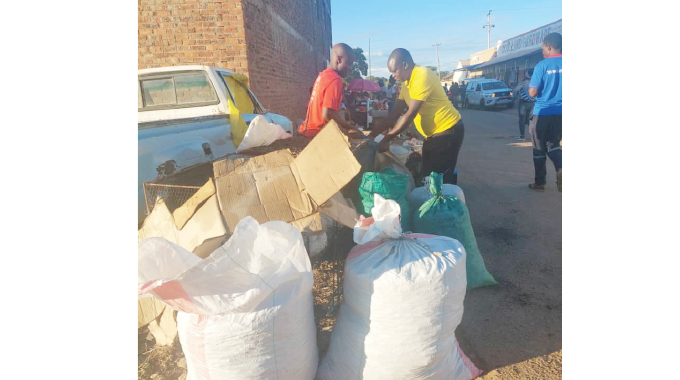Amacimbi harvesters bemoan buying cartels’ price offers

Descent Dube, Feature
Unscrupulous amacimbi (mopane worm) buying cartels have pegged the buying price of the delicacy between R150 and R250 per bucket, which they sell for around R430 in urban areas.
This is not sitting well with villagers in Matobo District.
Harvesters, considering the hard work they put in, feel R500 would be a fair price for their catch.

Renowned historian, Mr Pathisa Nyathi, once described the labour that goes into catching and processing the protein-rich delicacy saying, “Each caterpillar is caught singly, disembowelled and thrown into the smaller container. One must always keep one’s eyes open to identify where the well-camouflaged caterpillars are located.”
He said when you catch one, it writhes and wriggles, exhibiting some somersaulting gyrations to ward off its catcher by releasing an array of short stabbing spears into the hands of the catcher.
“The shongololo-like twisting is quite scary. I was tempted to throw away the self-defending creature but I would not let go,” wrote Mr Nyathi in an article titled Harvesting Mopane Worms: Down memory lane Part II.
He described the painstaking process of getting the edible worms ready for the market.
“A bonfire is made in the bush where firewood is relatively plentiful. When the fire is all glowing embers, a spade is used to push back the embers and create a centre into which the caterpillars are poured and covered up with embers and the hot soil. After a short while, a spade is used to mix up and turn over amacimbi like builders’ mortar.”
“Some pause ensues and after a while, the caterpillars are ready to pick up one by one. Some of the caterpillars end when they are sufficiently roasted. From here, the caterpillars are taken home for drying. Sometimes that turns out to be a challenge when the rains create a humid atmosphere that may lead to the harvest becoming mouldy.”
Villagers in Matobo say buyers are taking advantage of a lack of policy and framework that protects them from exploitation and safeguards the natural local resource as the buyers gang up and refuse to pay a cent more than R250.
In some parts of Gwanda, villagers have also complained that mopane worms may soon become extinct as outsiders who are not willing to pay villagers harvest them in a way that destroys their habitat.
“They destroy shrubs to get amacimbi. That is not the proper way to harvest them. When amacimbi mature, they go down from the trees to the ground. That is where one must catch them.

Mrs Moyo from Ward 8 disembowels Mopane worms
“Cutting down tree branches means we’re destroying where they live and soon we won’t have them. As it is, the numbers are dwindling every year,” said Mrs Nobuhle Mabhena from Tshanyaugwe.
She said harvesting mopane worms from trees means people would be getting them before they mature, which compromises the taste as they would be bitter.
The Forestry Commission has partnered with various entities to set up mopane worm-rearing facilities in Matabeleland South Province to save mopane worms (amacimbi/madora) from possible extinction due to various factors.
Traditionally, mopane worms were harvested in December and April each year but due to overharvesting, uncontrolled cutting of trees, harsh weather conditions and pests, some areas are going for years without producing them.
In a bid to protect the caterpillars, two mopane worm-rearing facilities have been set up in Gwanda, with one established in Ward 15 through the assistance of the Southern Alliance For Indigenous Resources (SAFIRE).
The other facility is in Ward 21 and was established under the Government-led Insects for Nutrition Programme.
In Matobo, villagers feel they would benefit from similar facilities but at the moment, their immediate war is against buying cartels.
One of the villagers, Ms Gugulethu Mlilo (30), said while the people in her community have been blessed with the vast availability of the delicacy, it has turned out to be some form of exploitation when buyers come to purchase the product.
“Gathering amacimbi is a demanding process, starting from picking them to drying them. In that process, we’re supposed to remove waste before cooking them. Our fingers are damaged when we’re removing waste and that, in my opinion, is supposed to determine the pricing of amacimbi,” said Ms Mlilo.
“The wish has always been to get something out of it. What we’re going through is painful as we spend the whole of December in the bush sigola amacimbi, only to get peanuts. Why is it like this when it comes to amacimbi?” quizzed a distraught Ms Mlilo.
Ms Sasha Ndebele (31) said, “We’ve been blessed this time, unfortunately, there are people who come to buy amacimbi with sick money. These people should understand what we’re going through in the process of gathering amacimbi until we dry them.”
Mr Kremer Moyo, another villager, said the situation is gloomier when they are desperate to get school fees and stationery for their children.
“It looks like we’re just working to be used at the end of the day. We should be the ones putting a price tag for our produce but just because we don’t know where to start and desperately need money, opportunists come to exploit us. We need the leadership to safeguard our interests and ensure we’re not exploited by these buyers,” Mr Moyo said.
Amacimbi are a nutritious delicacy and a source of income for many communities in Matabeleland South province. Some villagers say locals need to take control of the amacimbi market so that they benefit from selling them.












Comments